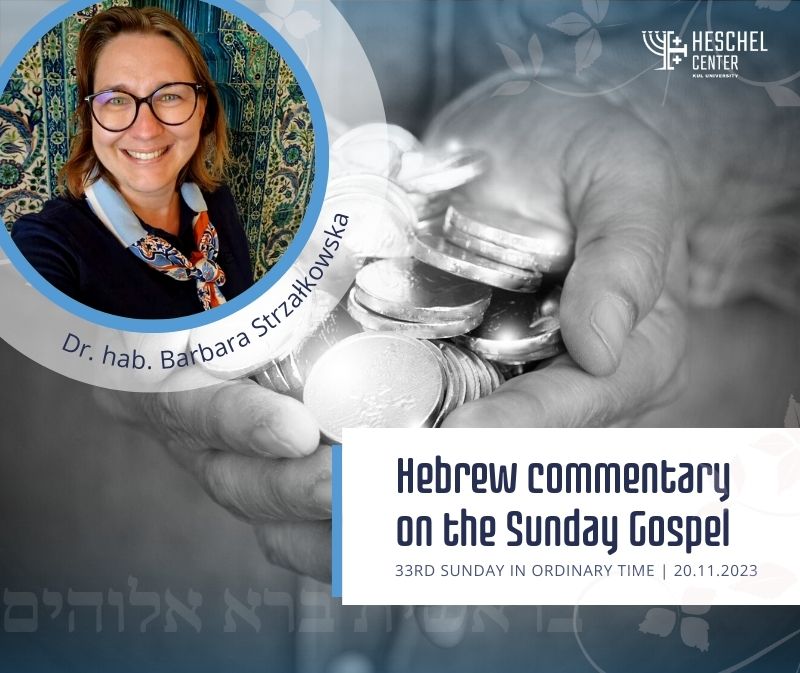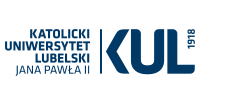The Desert Fathers Explain the Parable of the Talents
 The Desert Fathers say this: our spiritual life is like the Lake of Gennesaret and the Dead Sea. If we only receive the Word of God, the gifts of the kingdom, but do not share it with others, we become as dead as the Dead Sea. If we accept the Word and share it, then we become full of life like the Lake of Gennesaret, which is full of fish – writes biblical scholar and theologian Barbara Strzałkowska, PhD, Professor at Cardinal Stefan Wyszyński University in Warsaw (UKSW), commenting on Jesus' parable of the talents in a commentary for the Heschel Centre of the Catholic University of Lublin for Sunday, 19 November.
The Desert Fathers say this: our spiritual life is like the Lake of Gennesaret and the Dead Sea. If we only receive the Word of God, the gifts of the kingdom, but do not share it with others, we become as dead as the Dead Sea. If we accept the Word and share it, then we become full of life like the Lake of Gennesaret, which is full of fish – writes biblical scholar and theologian Barbara Strzałkowska, PhD, Professor at Cardinal Stefan Wyszyński University in Warsaw (UKSW), commenting on Jesus' parable of the talents in a commentary for the Heschel Centre of the Catholic University of Lublin for Sunday, 19 November.
The Holy Land has two main bodies of water: one full of fish, freshwater – Lake Gennesaret, and the other, very salty, in which there is no life – the Dead Sea. They are connected by the Jordan River, which flows at the foot of Hermon and then flows from the north into Lake Gennesaret. "Lake Gennesaret divides the waters of the Jordan, and then they flow south, and the Jordan ends its course in the Dead Sea," says Dr. Barbara Strzałkowska.
According to Dr. Barbara Strzałkowska, the commentary of the Desert Fathers explains the parable of Jesus, in which the householder entrusted his trusted servants with large sums of money. It is an important Gospel message. "We surmise that in Jesus' parable, these gifts are the gifts of the Kingdom, and the One who gives them is the Lord. And so one receives five talents, another two, and a third one talent."
At the same time, the theologian points out that the different sums received by the servants are not an expression of the Master's injustice but correspond to their abilities. "If anyone should be offended by why the Lord is so +unjustly+ distributing his gifts, the Gospel immediately comes with the answer: +THE LORD GAVE TO EACH ACCORDING TO HIS ABILITY+ (Mt 25:15). Elsewhere in the Gospel we read: +Much will be required of the person entrusted with much+" (Luke 12:48), writes Professor Cardinal Stefan Wyszyński University in Warsaw.
Biblical talent is often understood today as a skill, but in ancient times, it referred to a sum of money. "It can be assumed that the estimated value of the investments made in today's Gospel was 50, 20, and 10 thousand denarii. And a denarius is a salary for one day's work," explains the biblical scholar. "So the Lord entrusted his vast wealth to servants he trusted. To his servants. To the servants of the Kingdom. And His gifts are great," he adds.
Two servants multiplied the talents they had received, and one of them hid him. The latter's attitude did not please the host. "Ultimately, the reward of the Kingdom will be given to those who have multiplied the talents, THAT IS, THE GREAT GIFTS OF THE KINGDOM. THE GIFTS OF THE KINGDOM ARE GIVEN TO US IN ORDER TO INCREASE THEM. Why? Because faith – including our personal faith – grows when it is shared," writes Barbara Strzałkowska.
The parable of the talents and the commentary on it by the Desert Fathers carries a vital message: "As the day of reckoning approaches, believers should make the most of all that the Lord has entrusted to them. And to share the joy and hope that faith brings," the biblical scholar concludes.
KUL Heschel Center
The full text of the commentary follows:
The Kingdom of God once again – after last week's comparison to the wise and foolish virgins – this Sunday is compared to a man, a householder, who – according to the ancient custom – entrusts the management of his property to trusted servants and administrators.
The wealth that he entrusts to them is immense, and in Jesus' parable, these gifts are the gifts of the Kingdom, and the One who gives them is the Lord. And so one receives five talents, the second two, and the third one talent. If anyone is offended by the Lord's unjust distribution of his gifts, the Gospel immediately responds: "THE LORD GAVE TO EACH ACCORDING TO HIS ABILITY" (Mt 25:15). Elsewhere in the Gospel, we read: "Much will be required of the person entrusted with much" (Lk 12:48).
As we understand it today, talent is a gift and a skill, but in ancient times, it was also a specific and not insignificant amount. At different times in antiquity, the value of talent was calculated differently. It can be assumed that the estimated value of the investments made in today's Gospel was, respectively, 50, 20, and 10 thousand denarii. A denarius is the salary for one day's work. So the Lord entrusted his vast wealth to servants whom he trusted. To his servants. To the servants of the Kingdom. And His gifts are great.
The one who had five went and multiplied – gained the second five. The one who got two – gained two. And the person with one talent hid it, "the money of his Lord" (Mt 25:18). He didn't care what happened to the Master's property. Whether it multiplies or not, he preferred to bury what he had. He later explained that he was afraid and knew the Lord himself divided the gifts as He wished: "Master, I knew you were a demanding person, harvesting where you did not plant and gathering where you did not scatter; so out of fear, I went off and buried your talent in the ground. Here it is back" (Mt 25:24).
Ultimately, the reward of the Kingdom will be given to those who have multiplied the talents, THAT IS, THE GREAT GIFTS OF THE KINGDOM. THE GIFTS OF THE KINGDOM ARE GIVEN TO US IN ORDER TO INCREASE THEM. Why? Because faith – including our personal faith – grows when it is shared.
There is a story in the Holy Land about the Lake of Gennesaret, the Dead Sea, and the Jordan River. We know that the topography of the Holy Land is such that these two lakes, one full of fish, freshwater, Lake Gennesaret, and the other, very salty, in which there is no life, the Dead Sea, are connected by the Jordan River, which rises at the foot of Hermon, then flows from the north into Lake Gennesaret. Lake Gennesaret divides the waters of the Jordan, and then they flow south, and the Jordan ends its course in the Dead Sea. The Desert Fathers say our spiritual life is like the Lake of Gennesaret, the Dead Sea, and the Jordan River. If we only receive the Word of God, the gifts of the kingdom, but do not share it with others, we become dead, just as the Dead Sea only receives the waters of the Jordan River, but if we accept the Word and share it, then we become full of life like the Lake of Gennesaret, which is full of fish and whose waters are life-giving.
As the day of reckoning approaches, believers should make the most of all that the Lord has entrusted them. And to share the joy and hope that faith brings.
About the Author
Barbara Strzałkowska, Ph. D., is a Professor at Cardinal Stefan Wyszyński University in Warsaw (UKSW) – Head of the Department of Old Testament Exegesis and Head of Christian Religious Tourism Studies at the Faculty of Theology of UKSW; author and scientific editor of biblical books and scientific articles; a valued guide of pilgrimages to the Holy Land and biblical countries.
KUL Heschel Center





















